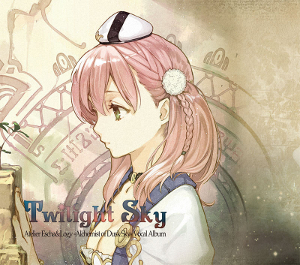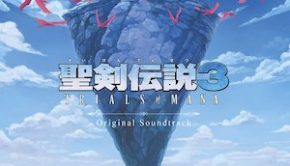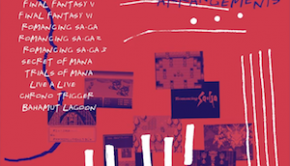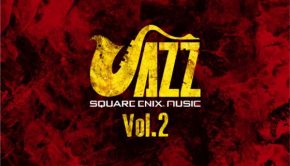Atelier Escha & Logy -Alchemist of Dusk Sky- Vocal Album: Twilight Sky
 |
Album Title: Atelier Escha & Logy -Alchemist of Dusk Sky- Vocal Album: Twilight Sky |
| Record Label: Gust |
|
| Catalog No.: GUSTCD-10011/3 |
|
| Release Date: June 26, 2013 |
|
| Purchase: Buy Used Copy |
Overview
With the release of Atelier Escha & Logy: Alchemists of the Dusk Sky, Gust Inc. has also released two albums containing the instrumental and vocal music of the game, with this review focusing on the performances given in the vocal album. Similarly to its soundtrack, we have guest composers such as Hideyuki Kinoshita and Hiroki Kikuta showing off their talents alongside vocalists like Haruka Shimotsuki and Rurutia. However, how does it compare to its predecessor, the Atelier Ayesha vocal album? And are these songs enjoyable on their own?
Body
In contrast to Ayesha’s Twilight Hour vocal album, Twilight Sky opens up with an instrumental track composed by Hayato Asano titled “Intro -Towards the Twilight-”. This is a light piano piece accompanied by the chirping and singing of birds, which gets the listener into a peaceful state as string are introduced into the song. While it could stand to be a bit longer, it does a good job as an introduction and getting the listener ready for the rest of the album. However, it has something of a jarring sound at the end as it transitions into the next song.
The next song is the full version of the game’s opening theme “Milk-Colored Ridge”. I can only describe it as a slow rock song, though I feel it’s somewhat out of tune not only with Ayesha’s opening (“Flower Marks”) but also with those of the previous Atelier games due to its musical style. However, Yuu still does a nice work with the singing, as also do the rest of the Chirinuruwowaka members to which she belongs. However, I can also this extended version also adds a bridge with clapping sounds, but overall it’s not very different from its game-size version recorded in the soundtrack.
Next, we come upon a rather interesting combination, to say the least, as “Laws of the Heavens and Earth” was composed by Hiroki Kikuta and sung by Haruka Shimotsuki. I was pretty curious about how this would turn out, and I wasn’t disappointed. The opening, with a Bulgarian-styled chorus, tolling bells and orchestra, signals we’re in for a treat. The melody has an elating quality and works as an excellent scene setting piece, while Shimotsuki’s performance both as a gentle main voice and as a majestic back chorus is splendid like always. It all works marvelously together with Kikuta’s melodies, with the song ending right as it began. That said, I’m curious what an independent collaborative work between them, like what she did with Noriyuki Iwadare for her Tindharia series albums, would turn out like if she ever made one…
Then we come upon a much less serious song, titled “Apple Gibberish – Ring on one, go to…” Sung by Yunca Amamoto and composed by Kazuki Yanagawa, it begins with singing over piano and harp lines accompanied of synth sounds, giving off the image of looking at a humorous or foolish situation taking place. However, it also features some nice piano interludes and a warm feeling to the end of its refrains. It also adds more instruments like flutes and string as it goes on, giving more complexity to its arrangement. While it isn’t the best song in the album in my opinion, it’s an enjoyable listen, even though the final reprise of the refrain seems like it could have used better mixing due to the choruses being a bit too loud.
The following “Scars of the Sky” is more of a return to the classical vocal sound of the Atelier series. This piece sung by Annabel and composed by Daisuke Achiwa brings back a lot of reminiscences of “Precious Words” from Atelier Iris 3: Grand Phantasm and it’s a very warm and beautiful ballad that boasts electric and acoustic guitars, as well as flutes. It doesn’t bring anything new to the table in composition or arrangement, but as the song is still nice to listen, it does its job.
Next we have “The Migrating Fishes’ Earliest Memorable Scene”, which was entirely made by Asaco Nasu. This song begins with a solo piano arpeggio before pausing and then mixing a calming piano line with wood percussions with Nasu’s voice, giving a very relaxing feel. Given it doesn’t have any surprise changes throughout its entire duration, it might seem as boring to some, but I find it could serve as a good listen prior to going to sleep, as there are parts in which it resembles a lullaby. However, like it happened with the introductory instrumental, it makes it have a rather jarring contrast with the next song…
Said song is titled “Revere Me! I’m a Fierce God”, composed by Yu Shimoda and sung by Haruka Shimotsuki. It has a rather unusual choral intro that changes tempo between slow and fast before settling down into a fast-paced melody composed of synth, percussions, electric guitar and voices. The song has a very distinct Japanese flavor to it, in consonance with its title, but it gives off a rather unsettling feeling between the noises and the background choruses, as well as the way Shimotsuki sings in her higher registers. However, I also have to say that it’s a bit repetitive, and for a more action-oriented theme, it has a severe lack of variation in its arrangement and structure, as it ends after repeating the song up to the refrain once.
Next we have the full vocal version of “Sky of Twilight”, which was featured just as an instrumental version in the soundtrack. Sung by Kanako Ito and composed by Shade, it is a progressive rock song that begins slowly, but then it explodes in guitar riffs filled with excitement. This same energy persists throughout the entire song, and though at times it slows down a bit, it is a very encouraging song, featuring some nice guitar interludes. We could be say that it describes very well the attitude both protagonists have towards alchemy and discovering the reason their world is in the state it is, as it is heard during the second to last boss battle necessary to obtain the true ending. I can also add that this version is a more enjoyable listen than the instrumental one, as the synth used in the instrumental one to fill in for Ito’s vocals is somewhat jarring to my ears.
Luckily, the next song allows the listener a bit of breathing room: it’s “Promise”, and we could say it is the full version of the “Promise (Piano Version)” and “Promise (Dusk Hill)” songs that were featured in the soundtrack, and like them, it was composed by Yu Shimoda. This time around it is a vocal arrangement performed by the Suginami Junior Chorus, which adds their voices to the piano line of the other versions. However, the arrangement of the piano here is more complex, making the melody richer. The addition of the chorus also makes it far more emotional than the other versions, which while beautiful, felt like they lacked something. Its only bad point is that it is very short, clocking at only 1:58 in length. However, I have also to say it also makes the point where it is heard very poignant: during a rescue one of the characters does on other as a floating ruin collapses, before showing a group of ruins and flowers glowing, which sets up the confrontation with final storyline boss.
However, we’re in for a rude awakening with “Colony Collapse Disorder”, which is the next song. With the same combination of performers and composer as the previous song, it’s very hard to describe this song due to how chaotic it sounds whenever the staccato-like opening chorus repeats. In general, it is a dark song that swings back and forth between slow and fast, which has some sweeping piano parts join with the constant electric guitar background every now on then. However, the chaos gets a little rest during the bridge in which the piano and guitars take the center stage, upon which the song repeats itself. This song is heard during the final storyline battle, so players who get to hear this song are pretty much on the right track to get the true ending in the game. And while the title might seem a bit strange, it has to do a lot with the story of the final boss, who herself happens to be inspired on bees.
Next, the pendulum swings in a rather different direction with “Infinity Chronicle”. This happens to be the full version of the “FJ: Infinity Chronicle” song that was recorded on the soundtrack and serves as the character Arwin’s finisher move theme. As the FJ version was just an extract from this one, it doesn’t change much from it, and overall we could describe it as a typical upbeat J-Pop song, though a very catchy one. Composed by the ACRYLICSTAB duo and sung by its singer UYU, while it opens with some bells, piano and string, and UYU’s vocal part begins soft enough, it soon enough reveals itself to be the quite the energetic piece incorporating some distortion effects. Despite everything, it comes off as a nice listen that makes me get up from my chair or bed and get something done.
And now for something calmer, we come upon the song for the aftermath of the final boss battle, which we could say is an ending theme itself: “Pluie”. It is composed and sung by Rurutia, and I have to say that it’s incredibly beautiful, being a ballad that makes excellent use of her soft and strong voice, starting just with just a piano as accompaniment and adding in the rest of the instrumentation during the refrain. I really loved it because it reminded me greatly of the song she made as the opening theme for the Popolocrois: Hajimari no Bouken anime adaptation, “Träumerei”, and because despite being so slow, it has a very emotional feeling to it that makes the listener feel as if they had really achieved something, as it happens to be the case when they hear it in the game.
And closing off the vocal part, we come upon the ending song “Sweet Reward”, also interpreted by Yuu and the rest of Chirinuruwowaka. While it’s a nice song, I somehow feel it doesn’t fit with the ending either, as it’s somewhat heavy and dark in tone for the name it has and the kind of endings the Atelier games tend to have, despite fitting well with the way the credits roll is presented. Though I have to point out it’s interesting how they fake out the listener by making it seem like it ends near the halfway point to then continue it. Also, unlike “Milk-Colored Ridge”, the version recorded here is identical to the one recorded in the original soundtrack.
However, there is one more track to listen: it is titled “Outro –Dreaming of the Green Lands-”, which is composed by Hideyuki Kinoshita,. While it seems initially to be an instrumental extension of “Sweet Reward” due to the music’s tone, a minute in it becomes a more cheerful and energetic piece that also has an orchestra come in to support the rest of the melody. The piece then gradually slows down until it ends in a soft arpeggio, bringing with it the feeling the album has closed off.
Summary
While I have to doubt one decision in the track ordering and that one of the songs seemed to need more work, I can say this album is every bit as good as the Twilight Hour one from Atelier Ayesha. The vocalists do a good work, and the composers also have put some marvelous melodies together that manage to fit in with the game world and with the context in which they are employed, even though two of them are somewhat out of tone with what was established in the previous game. Therefore, I have no problems recommending this album to anyone who likes any of the artists involved on it, or that likes the Atelier series.
Do you agree with the review and score? Let us know in the comments below!
4.5
Posted on August 19, 2014 by Gerardo Iuliani. Last modified on January 22, 2016.














